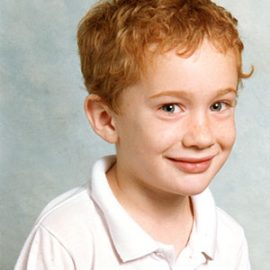
Clifford Field was born in 1908 in Chalk Kent, his mother was Edith Annie Field, a domestic servant living in Castle Lane, Chalk, Kent. She left the space for a father on Cliff’s birth certificate blank. After decades of searching, some luck followed by research in the National Archives in Kew proved that the missing father was Captain Frederick Robert Lloyd of the Royal Engineers, based in Chatham.

Frederick Robert Lloyd was born on 27 December 1876 in a farm called Ty-n-y-Caeau near Cilcain in Flintshire, Wales. His father was John Lloyd (also from Cilcain) and his mother was a separate family of Lloyds Sarah Lloyd from Halkyn. (The photo below is of John, Sarah and their children Frederick Robert and Margaret Mabel).

The Lloyds of Halkyn in particular were “well off”, with at least two large farms and a number of businesses in Haiti, Germany and stretching to Livorno in Italy. the Cilcain Lloyds were a less well off. John Lloyd’s farm was recorded as being 300 acres in 1881 but was sold by auction in 1884 and they moved to a much smaller farm Llanarch with only one domestic servant just as Frederick was growing up.
Frederick’s cousins and uncles (from the rich side) were mostly involved in local militia and the Royal Welch Fusiliers. His Uncle Edward was a colonel with a large property near Mold called Plas Hafod. His cousin was Llewellyn Edoardo Guglielmo Lloyd, famous Italian painter, born and died in Livorno (Leghorn as it was called in England).
Frederick was well educated for the times. He joined the Royal Engineers with a declared occupation of clerk/draughtsman (an educated person’s occupation). Butt he joined as a sapper, ie an ordinary soldier, his family could not afford to buy him a commission as was done for his Mold relatives. His Uncle Lieutenant Colonel Edward Lloyd provided the main reference for Frederick’s enlistment. Frederick’s choice of Royal Engineers rather than the Fusiliers was his probably his skills particularly as a draughtsman which would have been relevant to engineering. His enlistment records that he was enlisted as a pontonier (a builder of bridges).
At first Frederick was based in Aldershot, which is where he enlisted in 1896. His service record details a disciplinary in October 1896 for sleeping on sentry, but he soon rose to be a corporal. By 1898 he was in Chatham, the headquarters of the RE and was particularly commended as a good shot and had been promoted again to be a lance-corporal.
Next stop was South Africa in 1900 for the Boer war. Details of people’s lives are hard to come by but army records add detail. Frederick comes back from the Cape in 1902 to Chatham with the Queen’s and the King’s South Africa campaign medal with “clasps” for Kimberley, Orange Free State and Transvaal (photo of Cpl Lloyd in SA below).

Frederick was married (sort of) to Fanny Jane Rowland in Egham in Surrey in 1905. Why he was there we do not know, or perhaps she met him in Chatham, certainly her family was from Egham. Their first child Ethel Margaret Lloyd was born in 1906 in Chatham but christened in Egham. Importantly we say “sort of married” as he did not have permission from the army to marry, which was essential in those days. As a result his “wife” was not officially his wife and was not allowed to reside in married quarters. Frederick remarried his wife for the first time in Chatham, this time with army approval and she was allowed into barracks. A strange consequence of this is that somehow Frederick and his wife “forget” to record their first daughter Ethel in the 1911 census and on the 1921 census she is sneaked on at the end.
Whilst Fanny is pregnant in 1907 Frederick meets Edith Annie Field, who was working as a domestic servant for a Gravesend Family. She falls pregnant and gives birth to a son Clifford John Field (my grandfather) in February 1908 and Fanny gives birth to Wilfred George Lloyd in June 1907. Edith takes Frederick to the magistrates court for child support and a “Bastardy order” is granted and Frederick is ordered to pay her 3s 6d per week until Clifford is 14. DNA testing with Frederick’s sister’s descendant Linda Beekar proves this connection. Frederick has a further son Edmund John Lloyd in 1915 (Lance Corporal Jack Lloyd is killed in Kangaw, Burma in Jan 1945
Frederick rises through the ranks in Chatham between 1908 (Sargeant) to become Company Sargeant Major then Quartermaster Sargeant Major, eventually Lieutenant and finally in 1917 he is promoted to Captain. He retires from the Army in 1922 and stays in Chatham. Local newspapers record him as opening a sporting goods shop in Chatham High Street using his retirement annuity from the army.
The shop seems to do badly and he closes it and moves to London to live with his daughter Ethel and her husband Roy George Freeman. Frederick and his wife are there in 1927. Frederick is now down on his luck and joins the London Army Association which gets jobs for veterans. Frederick dies of pneumonia in 1937 and his occupation is given as newspaper vendor. It is not recorded if the selling was at a corner or in a shop, but we suspect the former.
There is no evidence of any contact between Frederick and his Welsh relatives but his sister Margaret Mabel is back in Aberduna near Mold with her alleged husband Vincent Beekar (who is described as a South African electrical engineer). Clifford Field never meets his father but does say he was told that his father was “Lofty Lloyd” (Frederick was 6’1” and Clifford and his sons were over 6’7) .
It is particularly sad that through Cliff’s early life in Chalk his father was billeted as Shornmead Fort about 3 miles away.


